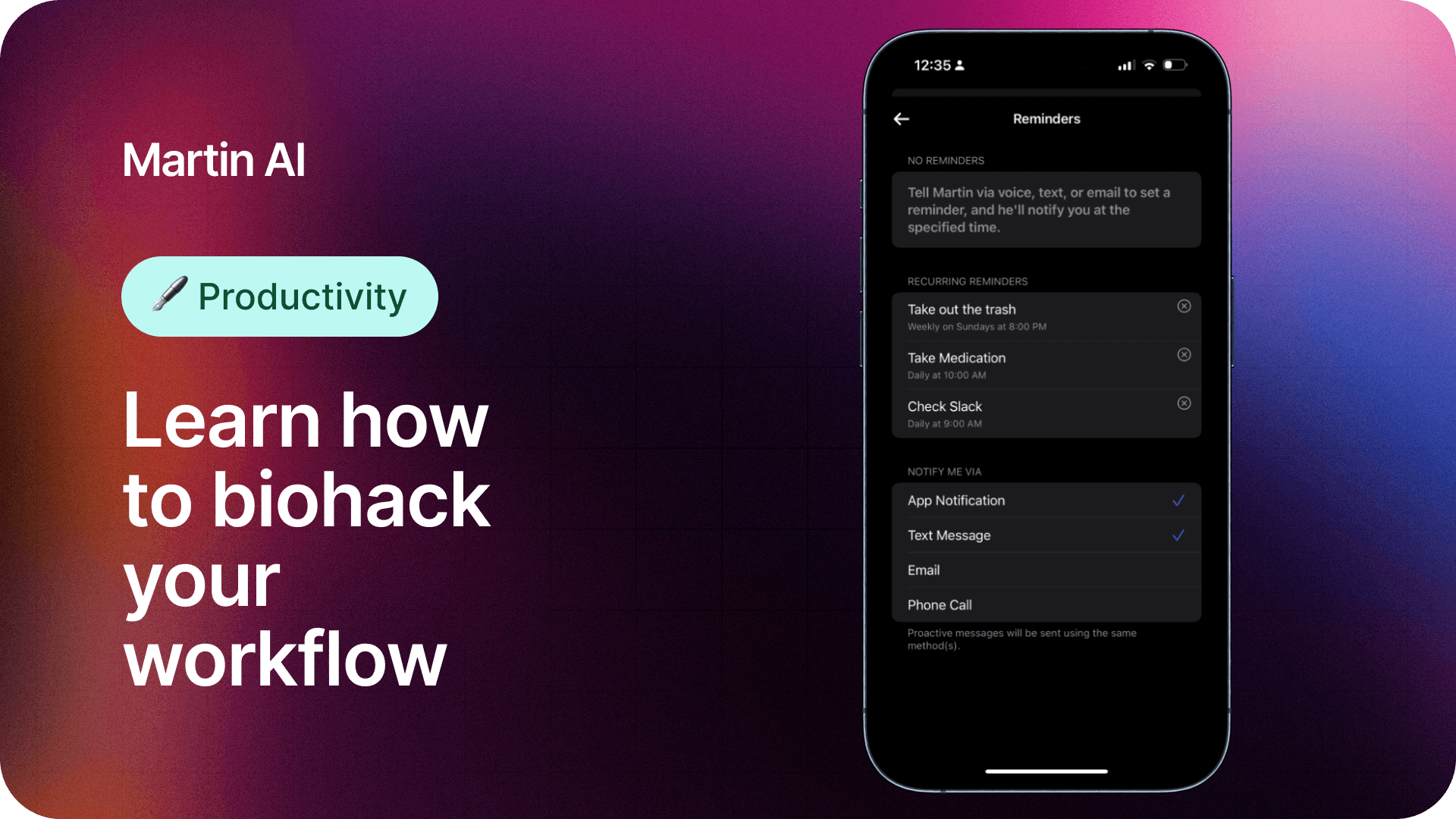Productivity
7 Ways to Biohack Your Workflow: The Science of Peak Performance
Oct 1, 2024
5 min read

Introduction
In our quest for peak performance, modern science has unveiled fascinating insights into how we can optimize our biology for enhanced productivity. This comprehensive guide explores seven evidence-based approaches to "biohack" your workflow, combining cutting-edge research with practical applications.
1. Mastering Your Circadian Rhythm
Understanding and optimizing your biological clock might be the most powerful productivity hack you've never fully explored. Research published in the Journal of Neuroscience has shown that working in alignment with your circadian rhythm can increase cognitive performance by up to 20%.
Understanding Chronotypes
Dr. Michael Breus, a clinical psychologist and sleep specialist, identifies four distinct chronotypes:
Lions (early morning people)
Bears (follow the solar cycle)
Wolves (evening people)
Dolphins (irregular sleepers)
Optimization Strategies
Peak Performance Window: Track your energy levels hourly for a week to identify your optimal working hours
Light Exposure: Get 10-30 minutes of morning sunlight to regulate your circadian rhythm
Meal Timing: Research suggests eating within a 10-12 hour window can enhance energy levels
Sleep Schedule: Maintain consistent sleep and wake times, even on weekends
Note: Martin offers tools to help track and optimize your daily schedule based on your unique chronotype patterns, though you can also use traditional methods like journaling or spreadsheets for tracking.
2. The Science of Nootropics
Cognitive enhancement through natural substances has gained significant scientific backing in recent years. Here's a detailed look at evidence-based options:
Natural Nootropics with Scientific Support:
L-theanine: Found in green tea, studies show it promotes relaxation without drowsiness
Bacopa Monnieri: A 12-week study published in Psychopharmacology demonstrated improved memory acquisition and retention
Lion's Mane Mushroom: Research in the International Journal of Medicinal Mushrooms suggests it may enhance cognitive function and nerve growth
Implementation Strategy:
Start with one supplement at a time
Document effects using a structured tracking system
Maintain consistent dosing schedules
Consider cycling supplements to prevent tolerance
3. Sound Frequency Optimization
The science behind binaural beats and their effect on cognitive function is fascinating and increasingly well-documented.
Different Frequencies for Different Tasks:
Beta waves (14-40 Hz): Enhanced focus and analytical thinking
Alpha waves (8-14 Hz): Relaxed alertness, ideal for creative work
Theta waves (4-7 Hz): Deep relaxation and creative insight
Delta waves (0.5-4 Hz): Deep sleep and recovery
Implementation:
Use high-quality headphones for proper stereo separation
Start with short sessions (15-20 minutes)
Experiment with different frequencies for various tasks
Create dedicated playlists for different work modes
4. Enhanced Pomodoro Technique
The classic time management method gets a biohacking upgrade, incorporating movement and recovery optimization.
The Enhanced Protocol:
25-Minute Focus Sprint: Complete elimination of distractions
5-Minute Biohacking Break:
Quick exercises to boost BDNF (Brain-Derived Neurotrophic Factor)
Box breathing exercises (4-4-4-4 pattern)
Vision exercises to reduce screen fatigue
15-Minute Reset (after 4 cycles):
Short meditation session
Power nap (ideal length: 10-20 minutes)
Light stretching or yoga
5. Environmental Optimization
Your workspace significantly impacts your cognitive performance. Here's the science behind creating the optimal environment:
Key Elements:
Lighting: Natural light exposure increases productivity by 2-5%
Air Quality: NASA studies show certain plants can remove up to 87% of air toxins
Temperature: Research indicates 70-72°F (21-22°C) is optimal for cognitive performance
Ergonomics: Standing desks can increase energy and focus while reducing back pain
Implementation:
Regular air quality monitoring
Strategic placement of air-purifying plants
Blue light management systems
Ergonomic workspace assessment and adjustment
6. Micro-Mindfulness Integration
Research shows even brief mindfulness practices can significantly impact cognitive performance.
Science-Backed Techniques:
Box Breathing: Navy SEAL-endorsed stress reduction technique
Body Scanning: Quick stress and tension release
Noting Practice: Improved focus and reduced mind-wandering
Integration Strategy:
Set specific triggers for mindfulness practices
Start with 60-second interventions
Scale up duration as comfort increases
Use technology to track consistency
7. Strategic Cold Exposure
The science behind hormetic stress and its cognitive benefits is compelling.
Benefits Supported by Research:
Increased norepinephrine by up to 530%
Enhanced focus and alertness
Improved stress resilience
Better emotional regulation
Implementation Protocol:
Start with 10-second cold water exposure
Gradually increase duration
Practice controlled breathing during exposure
Track recovery and adaptation
Conclusion
Biohacking your workflow is about making small, science-backed adjustments that compound over time. While tools like Martin can help streamline this process with reminders, lists, and briefings, the key is consistent implementation and careful observation of what works best for you.
Ready to start optimizing? Consider trying these techniques one at a time, carefully documenting their effects on your performance. Martin can help you track your progress, but any consistent journaling or tracking method will work.
Remember, the goal isn't perfection but progress - small improvements compound into significant changes over time.
[Note: Always consult with healthcare professionals before starting any new supplement regimen or making significant changes to your daily routine.]